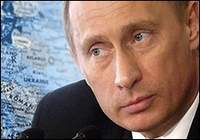Putin goes online to take people’s challenges
President Putin is to communicate with people over the Internet during his online conference tomorrow, July 6, at 5 p.m. Moscow time. Putin’s first public appearance on the world wide web took place five years ago on March 6 2001. Lat time the president answered only 32 from 21,357 questions from Internet users. A certain part of the questions was selected as a result of special competitions held in various regions of the Russian Federation.

Five years ago Russian web surfers were mostly interested in an opportunity to catch Putin on the net and ask him a question out of idle curiosity. The people were also interested in problems of the housing and communal field, bureaucracy, changes in the Tax Code of Russia, the situation in Chechnya, etc. Foreign correspondents were mainly interested in Russia's reaction to USA’s plans to deploy the national Air Defense system.
Putin’s second online conference will take place tomorrow in the Kremlin. Questions started arriving from June 30. A special program filters the messages deleting stupidities and unquotable remarks from people. For the time being the head of state has received almost 500,000 questions. Moderators say that the subject of the army service is the most actual issue for Russian people taking into consideration the fact that Russian web surfers are presumably young people in their twenties or thirties.
Aside from questions received from Russian draftees, over 11,000 people want Putin to explain his recent trick in the Kremlin when he spontaneously kissed a little boy Nikita in his stomach. Some 2,500 people want Putin to tell them at what age he started dating girls.
Foreign citizens are much more serious with their questions. Most of them are interested in politics, the current state of affairs in Chechnya, freedom of speech in Russia and the president’s attitude towards Russian oligarchs.
It is worthy of note that Russia’s first President Boris Yeltsin organized his online conference on May 12, 1998. Yeltsin was originally believed to become the earliest Internet explorer in the world of international politics. It turned out later, though, that then US Secretary of State Madeleine Albright took the lead over Yeltsin when she had had an online communication with schoolchildren from 47 countries of the world. Albright was answering their questions about USA’s foreign politics and international relations.
Nevertheless, Boris Yeltsin remains the online pioneer for Russia. He was talking to online surfers eight years ago with the help of the US-based company MSNBC and answered 14 from 4,000 questions.
Trud
Translated by Dmitry Sudakov
Pravda.Ru
Subscribe to Pravda.Ru Telegram channel, Facebook, RSS!





